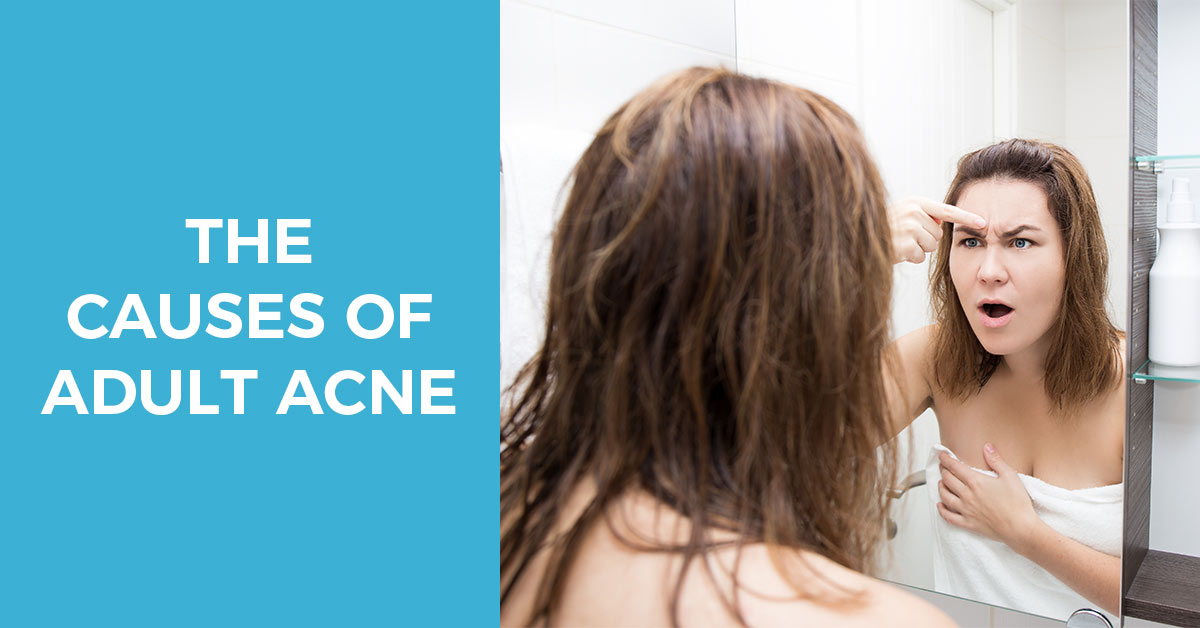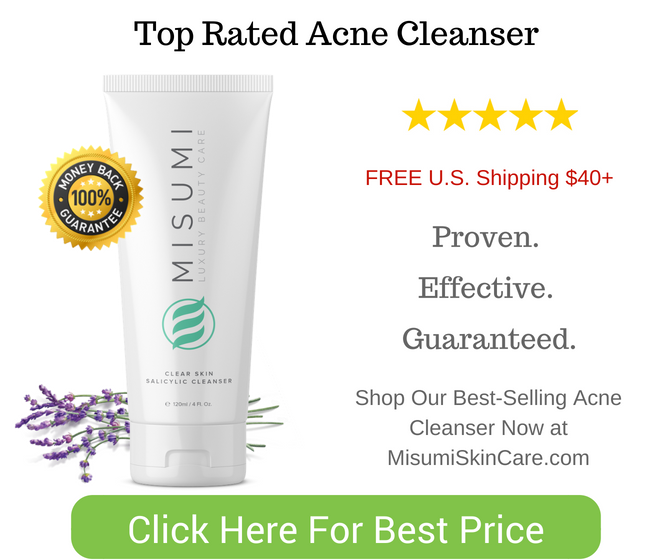Contents
In fact, recent studies suggest that 40 to 55 percent of adults from the ages of 20 to 40 are suffering from oily skin and mild, persistent acne. The Journal of American Academy of Dermatology also adds that 54 percent of women age 25 and over have some form of facial acne. The study also demonstrated that, in 12% of women, acne is likely to continue into middle age.
So, what causes adult acne and why is it on the rise?
The research also found that those with adult acne are likely to have fewer comedones (blackheads, whiteheads, and papules) compared to teenage acne and t he acne is more likely to be inflammatory. Lesions will be located mainly around the jawline, chin, and mouth, instead of the T-zone. And due to the fact many adults also suffer from sensitive skin and/or other skin conditions, treating adult acne can be more challenging than teenage acne.
Below, we’ve not only revealed the primary causes of adult acne but we’ve also debunked some common myths for you too.
And you’ll also find some helpful tips on how you can ward off future breakouts.

Adult acne before and after

What Causes Adult Acne?
As we’ve already seen, adult acne is increasingly common in people aged 20, 30, 40, and even 50. And there are a number of reasons why you might be part of this statistic, including:
• Adult Acne and Hormone Levels
As an adult, and especially if you’re a woman, you’ll often have a fluctuation in your hormone levels. When there’s an imbalance, this can cause a breakout. That’s why many women will suffer from acne when they’re menstruating, they’re pregnant, they’re going through menopause, or they’re starting or discontinuing birth control pills.
• Adult Acne and Stress
Some research has found a link between acne flare-ups and stress. That’s because, when we’re stressed, our bodies release more androgens (a male hormone, which is also found in women).  These hormones are responsible for stimulating hair follicles and oil glands that are found in our skin. As your skin starts to produce more oil, this can cause acne because your follicles become blocked.
These hormones are responsible for stimulating hair follicles and oil glands that are found in our skin. As your skin starts to produce more oil, this can cause acne because your follicles become blocked.
This can also create a vicious circle because your breakout causes more stress, and your stress causes more breakouts!
This can also create a vicious circle because your breakout causes more stress, and your stress causes more breakouts!
• Adult Acne and Your Genes
If you’ve got a close blood relative, such as a sibling or parent, who suffers from acne, it could increase your risk of developing the skin condition too. Researchers have also found that a genetic predisposition for acne may be found within some people. Therefore, if you have this predisposition, it’s more likely that you’ll develop acne at some point in your life.
• Adult Acne and Skin Care and Hair Products
Adult acne can be worsened by the products you’re using on your skin and/or hair. If you do have acne or there are cases of acne in your family, look out for products that are labeled as being:
- Oil-free
- Non-acnegenic
- Non-comedogenic
- Won’t clog pores
All of the above will help make sure your pores are kept as clear as possible and don’t become clogged with oil, dead skin cells, and product. As these products won’t contribute to your acne as much, opt for cleansers, moisturizers, sunscreens, and other products that have one of the above properties.
• Acne and Medication Side Effects
Some medications will have the side effect of acne. If you’ve noticed that you’ve started to develop acne after taking a medication or your acne has gotten worse, continue to take your prescribed course while also seeking the advice of your doctor. Ask them if acne is a side effect and, if it is, whether there’s an alternative medicine you could take. If not, you may want to seek the advice of a dermatologist who will be able to prescribe a treatment for your acne that won’t interfere with the medication you’re taking.
• Acne and Other Medical Conditions
In some cases, acne can arise as the result of an undiagnosed medical condition. You should find that, when the medical condition has been found and treated, your acne clears up too.
1. Adult Acne and Poor Hygiene
In fact, washing your skin too frequently only adds to the problem as you start to dry your skin out. And when your skin dries out, it starts to produce more oil. What does this oil do? Contribute toward your acne! Therefore, washing your skin twice a day (and after exercise) is all that’s recommended.
2. Adult Acne and Your Diet
For example, eating chocolate and chips and drinking lots of caffeine aren’t proven to cause acne. But there are some diets that are thought to increase your risk of developing acne. These are ones that are high in sugar, dairy, refined carbs, and red meat.
3. Adult Acne and Wearing Makeup
But, thankfully, cosmetics have moved on a lot since the above theories were established. Now all you need to do is shop for your cosmetics with as much savviness as you shop for your skin care products. Look for specialist makeup that is oil-free and won’t clog up your pores. The best types of makeup are ones that contain salicylic acid, which helps to fight breakouts, and ones that are labeled as being non-comedogenic or non-acnegenic, which means they won’t clog up your pores or cause breakouts.
Combatting Adult Acne with Your Skin Care Regime
It’s important to use a cleanser every day, twice a day. Use a gentle cleanser that’s designed for sensitive, acne-prone skin before washing this off with lukewarm water. Use your hands to wash your face and don’t rub your skin dry afterward – just pat it with a clean towel.
There are also a number of over-the-counter lotions and creams that are available for adult acne. Retinoid lotions and creams not only help clear your skin but they’re also great for combatting wrinkles (bonus)!
Another acne-fighting product is benzoyl peroxide, but you should only use this occasionally as it can dry out your skin. If it does, you might want to try a milder form of this product.
For a targeted spot treatment that you use when you have a breakout, sulfur products can be beneficial. However, again, these shouldn’t be used frequently.
Combatting Adult Acne with Prescription Medications
If you can’t get rid of adult acne with day-to-day products, you might want to seek the advice of your doctor. They can prescribe a medication that helps combat your acne by either controlling your hormones or fighting the bacterial infections that are causing your acne.
Birth control pills are often prescribed for women who are suffering from acne as they help regulate your hormones, reducing the risk of imbalance which is causing frequent breakouts.
Alternatively, an antibiotic might prove to be the effective treatment you need. Or you may be prescribed Aldactone (spironolactone), which has been found to treat acne even though it was originally developed to tackle high blood pressure.
Stronger treatments include Isotretinoin, but if you’re planning to get pregnant or you already are, you can’t take this.
Combatting Adult Acne with Light Therapy
The red light used in light therapy for acne has been found to have anti-inflammatory properties, while the blue light that’s also used targets and kills the bacteria that causes acne.

Conclusion
By identifying the potential triggers for your acne, altering your skin care and the products you’re using, and seeking advice from a doctor/dermatologist if your acne is severe, you should be able to improve your skin dramatically.
Remember, acne isn’t something you just have to “deal with.” There are solutions available, and even though nothing works overnight, after a few months you should start to notice a difference.
Do you suffer from adult acne? What types of treatments and medication have you tried, and what have you found most successful? Please share your comments and thoughts with us and our readers below!



